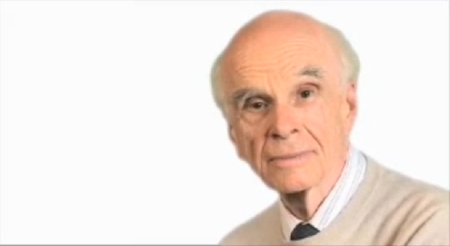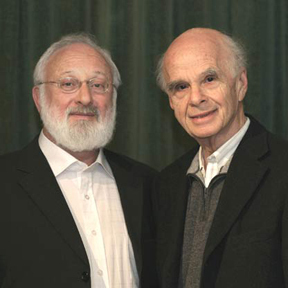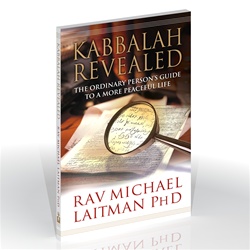
I am delighted and honored to have been asked to write the introduction to Dr. Laitman’s Kabbalah Revealed: A Guide to a More Peaceful Life. Not only is the author a dear personal friend, he is, in my view, the foremost Kabbalist alive today, a genuine representative of a wisdom that has been kept secret for two millennia. Now that the wisdom of Kabbalah, among other indigenous wisdoms, is emerging full scale, I believe no other person is better suited to expound on its essence.
In today’s world, the emergence of Kabbalah as an authentic means of instruction is of unique significance. It can help us regain awareness of the wisdom that our forefathers possessed, and which we have forgotten.
Indigenous wisdoms are appearing today precisely because our customary, mechanical school of thought has failed to provide the well-being and sustainability it had promised. A Chinese proverb warns, “If we do not change direction, we are likely to end up exactly where we are headed.” When applied to contemporary humanity, this could prove disastrous:
Climate change is threatening to turn vast areas of our planet into unlivable, lifeless soil, unsuitable for human habitation and inadequate for food production.
Additionally, most of the world’s economies have become less self-sufficient. This is ominously coupled with the worldwide diminution of food reserves. There is less available freshwater for well over half of the world’s population. On average, more than 6,000 children perish each day from diarrhea caused by polluted water.
In many parts of the world, violence and terrorism have become the favored means to resolve conflicts. Hence, there is deepening insecurity in both rich and poor countries. Islamic fundamentalism is spreading throughout the Muslim world, neo-Nazi and other extremist movements are sprouting in Europe, and religious fanaticism is appearing the world over.
Thus, our very tenure on this planet is in question.
However, global breakdown is not mandatory. We can turn the tide, and the following scenario, too, is entirely possible:
As the latter part of this book will show, we can pull together and pursue shared objectives of peace and sustainability. Business leaders can recognize the groundswell of change and respond with goods and services that meet the shift in demand.
Global news and entertainment media might explore fresh perspectives and emerging social and cultural innovations, and a new vision of self and nature will emerge on the internet, on television, and in communication networks of enterprises and communities.
In civil society, a culture of alternative living and responsible values will lend support to policies of social and ecological sustainability. Measures will be taken to protect the environment, create effective food and resource distribution systems, develop and use sustainable energy, transport, and agricultural technologies.
In this positive outlook, funds will be redirected from the military and defense establishments to serve the needs of the people. Supported by these developments, national, international, and intercultural mistrust, ethnic and racial conflicts, oppression, economic inequity, and gender inequality will all give way to mutual trust and respect. People and communities will readily cooperate and form productive partnerships.
Thus, rather than breaking down in conflict and war, humanity will break through—not merely to a sustainable world of self-reliant and cooperating communities, but to a joyous future of peace, tranquility and complete self-fulfillment.
A peaceful and sustainable world can await us all, but alas, we are not presently headed in this direction. Einstein told us, “The significant problems we face cannot be solved at the same level of thinking at which we created them.” Yet, we are trying to do just that. We are trying to fight terrorism, poverty, crime, environmental degradation, disease, and other “sicknesses of civilization” with the same methods that produced them in the first place. We are attempting technological fixes and temporary remedial measures. Yet we have not mustered the will, nor the vision to create a lasting and fundamental change.

Planetary Consciousness
In light of today’s global crises, humankind has begun to seek new avenues and modes of thinking. Such modes are the ancient, albeit very pertinent, indigenous wisdoms. To them, planetary consciousness is not merely an ancillary notion, but their very essence. When we study these modes, we realize that the new planetary consciousness is actually an old, perennial consciousness; only now it is being rediscovered.
Indeed, it is high time that planetary consciousness was rediscovered. We used to think that the typical, “normal” human consciousness is what we capture with our five senses. We considered everything else imaginary. The common perception was that we ended where our skin ended. Other views were considered “new age,” “mystical,” or “esoteric.” Ideas that we somehow belong together, that there is a context in which we are parts of a greater whole, have been considered the exception in the history of civilization.
But if we look at the history of ideas, we will find that the truth is quite the opposite. The reductionist, mechanistic, and fragmented thinking that evolved in the Western world over the last 300 years is not the norm, but the exception. Other cultures do not share this view. Even the West did not adhere to it prior to the emergence of the mechanistic worldview that it inherited as an application (or rather, misapplication) of Newton’s philosophy of nature.
In other cultures, as well as in the Western world preceding modern times, the prevailing consciousness was one of belonging, of oneness. Most traditional cultures do not agree that people have nothing in common but passing interests that happen to coincide.
The classical roots of all the wisdom traditions are concepts of a “planetary consciousness.” This term defines the awareness of our shared fate as human beings, as citizens of this planet. If we are to sustain our existence, if we are to ensure that our children and grandchildren have a secure and sustainable future, we must foster a planetary consciousness.
To move forward, we must cultivate a mindset that enables us to form a united human family, a planetary civilization. However, this civilization should not be a monolithic culture where everyone follows the same ideas, and one person or nation dictates those ideas to everybody else. Rather, it should be a diverse civilization whose elements join together to maintain and develop the whole system, the planetary civilization of humankind.
This diversity is the element of harmony, the element of peace. Every society that has survived has possessed it. Only Western and westernized societies have forgotten it. In the process of creating technical and economic progress, they have fragmented the integrity, the oneness of the system. It is high time we restore it.
As I learned through my acquaintance with Dr. Laitman’s writings, Kabbalah in its authentic form not only promotes the concept of oneness and the integrity of humanity and the universe, it also offers practical measures to restore it when lost.
It is my heartfelt recommendation to read carefully through this book, as it provides much more than general knowledge about an ancient wisdom. It also provides a key to ensure the well-being of humanity in these critical times, when we face the unprecedented challenge of choosing between the devolutionary path leading to worldwide breakdown, and the evolutionary path that can bring us to a world of peace, harmony, well-being, and sustainability.
The above text was taken from the book Kabbalah Revealed: A Guide To A More Peaceful Life by Dr. Michael Laitman with foreword by Prof. Ervin Laszlo. Also available as eBook (PDF, Kindle & ePub formats), and for free PDF download.


